The age of vitriol: Edward Luce on US politics and social media
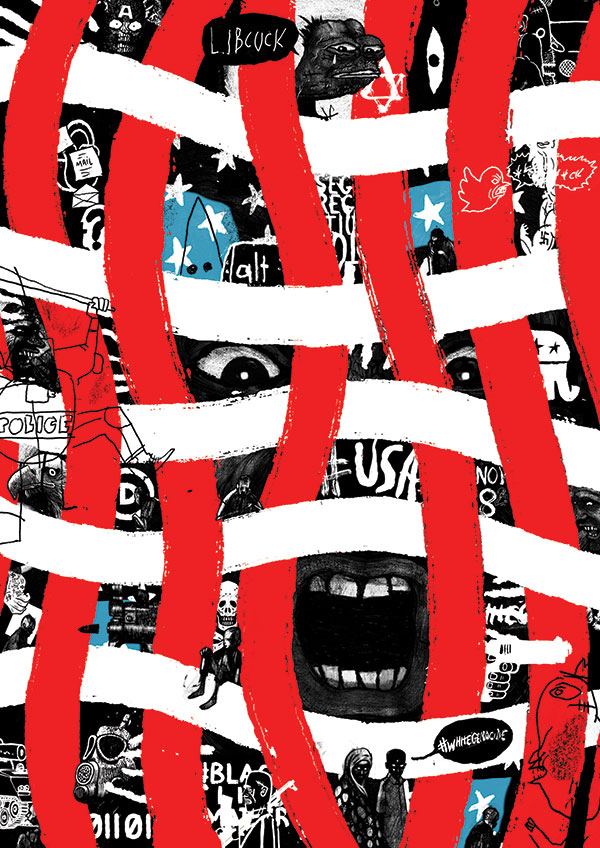
I was first alerted to Richard B Spencer by a horrific Twitter post. The tweet in question showed the ubiquitous photo of a Syrian boy, face covered in blood and dust, with the tagline: “Hey, let’s start WWIII for this f***king kid!” Like most people who saw it, I was offended. That, of course, was the point. Unlike many of his peers, Spencer tweets under his real name. He then revels in the outrage.
Provocation is the goal of the so-called alt-right — the amorphous world of rightwing extremist groups that have thrived in the age of Donald Trump. Memes, such as the one of the Syrian boy, are their weapon. Notoriety is their oxygen. The past year or two have been a field day. “No matter what happens, I will be profoundly grateful to Trump for the rest of my life,” says Spencer.
After what seems like the worst-tempered US election ever, America will at last make its decision on Tuesday. History may look back on 2016 as the year when the US finally chose a woman to lead it, or when the postwar US-global order started to break up. Others will remember it as the election when a rank outsider — a reality-TV star, no less — stormed the citadel and changed the way the game was played.
For my part, having lived in America on and off since the end of the past century, this is the year when democracy’s sense of restraint seemed to vanish. The glue of mutual respect that is so vital to any free society came unstuck. People no longer bother trying to persuade each other. They simply shove their views — or the mere fact of their identity — in your face. Or else they just insult you. The more retweets the better.
For all its pluses, social media has drowned politics in vitriol. New technology has opened up a galaxy of thought once confined to libraries, but it has also enabled ancient prejudices to seep back into the mainstream — anti-Semitism, for example, and hatred of women. In the past few months, the Twitter hashtags #whitegenocide (the view that whites are endangered by multiculturalism) and #repealthe19th (the US constitution’s 19th amendment gave women the right to vote) have trended heavily.
Obnoxiousness has infected all sides of the spectrum but the right has learnt how to play the game better. Partly because it is rebelling against political correctness, it works with fewer boundaries, or none at all. The level of trust between electors and elected has been falling for years. In 2016 the electorate has begun to turn viciously on itself. Is this a blip or a permanent shift? The future of free society may depend on the answer. Democracy cannot prosper for long in a swamp of mutual dislike.

One of social media’s key features is anonymity. When you engage with someone directly, it is harder to maintain an angry tone. Everything I knew about Richard Spencer suggested our conversation would be brief. It turned into a longer exchange than I expected.
Along with Jared Taylor, the founder of American Renaissance, a white nationalist group, Spencer is credited with creating the alt-right — it was he who coined the term. At 38, he is something of an elder among alt-right activists. It is a movement that measures its progress in decades, says Spencer. “Trump is an awakening,” he says. “Whatever happens, the war will go on.”
Even if the US halted all immigration today, whites would still become a minority by 2055. In the absence of that, America is on course to cross the mark more than a decade sooner. Spencer believes political correctness is destroying American society. “By highlighting everyone’s differences, society has made whites aware of their ethnic identity — and resentful,” he says. “America is headed for a big crack up and I believe it will happen in my lifetime.”

The alt-right’s goal is to “create American national feeling in a cosmopolitan world”, he says. The question is how to achieve that. Contrary to what I expected, Spencer is bookish. He studied as an undergraduate at the University of Virginia, a postgraduate at the University of Chicago and started — though abandoned — his PhD at Duke University. His major was English but he was increasingly diverted by philosophy. The late-19th-century thinker Friedrich Nietzsche was his first big influence, followed by Martin Heidegger, the 1930s German philosopher celebrated by the Nazis, and contemporary writers such as Roger Scruton, the English conservative.
Like much of the alt-right, Spencer disdains foreign wars, particularly if fought for humanitarian reasons. Hence his message about the Syrian boy. Another tweet, published on Spencer’s Radix Journal account, identifies those whom he believes are culpable for America’s wars of choice. It features a panel of 16 Bush-era neoconservatives — among them Paul Wolfowitz, Eliot Cohen and Richard Perle — with the line: “Architects of the illegal Iraq war. And we’re with her (Hillary Clinton).” It is framed by the sentence: “Hmm: what do all these people have in common? #coincidence.” The answer, of course, is they are Jewish.
Every few days a group of alt-righters record a podcast called the Daily Shoah (the Hebrew word for Holocaust), on which Spencer regularly appears. Participants are known as “Death Panellists”. Spencer often greets his “fellow goyim” (the Hebrew word for non-Jews). It does not get less subtle than this. They also put great store on style. Many of their hashtags begin with #fash, which blends fashion with fascist. Thus Mussolini was a “#fasharapper”.
Whenever Spencer, or a follower, tweets about a Jewish figure, or someone they think to be philo-Semitic, they put triple brackets on either side of their name. It is the Twittersphere’s version of the yellow star. To subvert the symbol, Jewish journalists have taken to doing it themselves (((as have plenty of others))).

I ask Spencer why he does this. He seems capable of reasoned argument, even if his views repel. Yet he chooses not to. “We live in a post-literate age,” he says. During the enlightenment people made their case through books — everything was mediated via the written word, he says. We are heading back to the pre-enlightenment era. People didn’t read the Bible then; they looked at it. A clever meme may use a dash of text but it is essentially an image, or a video, that speaks to people’s emotions — “like a hieroglyph or a stained-glass window”, he says. The more it grabs them the better.
Perhaps the best example is Pepe the Frog. Once a harmless comic character, he has morphed into an online symbol of white power. Pepe features as Donald Trump, a member of the Ku Klux Klan, a sexual predator or Nazi stormtrooper. Like those scary clowns, it is Pepe’s optic innocence — a cartoon green toad with bulging eyes — that makes him so menacing. “Pepe’s this smug badass, who doesn’t give a shit — that is what makes him so cool,” says Spencer.

Like other movements, the alt-right holds conferences, gives speeches and feeds the metastasising online world of white nationalist news sites. But its real fuel is anonymous trolling. To skim the average comments section is to be cured of any illusions about Socratic democracy. Someone quipped that Trump’s candidacy was like the “comments section running for president”. Twitter is the comments section run amok. It is also where memes get the biggest bang for their buck.
“They make people feel, rather than think,” says Spencer. “That is their raw power.” So what was his pitiless tweet about the Syrian boy supposed to make us feel, I ask. “How was the original image supposed to make you feel?” Spencer says. “That picture was posted again and again by liberal humanitarians to drum up support for US military intervention in Syria. They weren’t making a rational case. They were playing on your sense of pity to lead you into backing another foreign adventure that would further weaken America. Is that any better than what I posted?”
What about his anti-Semitic image of the neoconservatives? “All Jews might not be neoconservative but all neoconservatives are Jewish,” he replies. “You may call it [the meme] anti-Semitism. I say it is relevant information.”
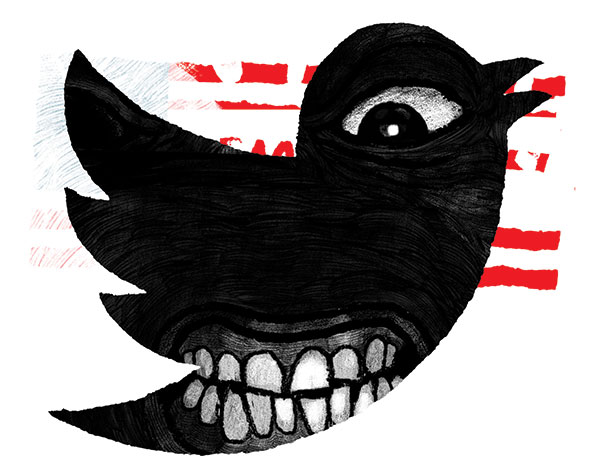
So where does he draw the line? Online behaviour has offline consequences. Spencer knows imagery creates feelings that can trigger real-world actions. That is surely the point of what he does. I ask him about Julia Ioffe, a Washington-based journalist, who is also Jewish. Having written an article in May that upset Melania Trump, the prospective first lady, Ioffe was brutally threatened by online neo-Nazis. They posted her home address and telephone number — a practice known as “doxing”. Someone hacked her account and ordered a coffin to be delivered to her home. Another booked homicide clean-up services.
Spencer is familiar with Ioffe’s case. “I draw a line at any threat of personal violence,” he says. “That is not what I’m trying to achieve.” It sounds like a Jesuitical distinction to me. Along with the explicit death threats, Ioffe was bombarded on Twitter and other social media with chilling reminders of the Holocaust. She was also targeted by Breitbart News, the far-right website whose former head, Stephen K Bannon, now runs Donald Trump’s campaign.
The worst attacks came from the Daily Stormer, an openly Nazi website. It took a picture of the seven-year-old Ioffe from her Facebook account and pasted it on to lampshades, bars of soap and so on. She received a coffee mug in the mail with her face Photoshopped on to an inmate’s uniform wearing a yellow star. On it was written: “Welcome to Camp Trump”.
Most of the deluge was anonymous. Ioffe, 32, who was born in Russia and spent her first seven years there, says she was used to handling vicious trolling. She encountered a lot of abuse when she was based in Moscow as a foreign correspondent. But there were several things that unsettled her about what followed her Melania Trump article. The language was openly Nazi.
“In Russia, they would accuse you of being an agent for Mossad, or the CIA,” she says. “This was different — it was pure ancestral, biological hatred.” She was called “a filthy Russian kike”, and worse. There was also the effect on her parents, who left Moscow to escape the glass ceiling facing Jews. “There are no greater patriots than my parents,” says Ioffe. “But what they have seen recently has dented their faith in America. They did not expect those hatreds to follow them to the new world.”
Then there was the boldness with which her online trolls responded. Two years ago, they would shrink when she confronted them. Now they come back twice as hard. “Their tail is up,” says Ioffe. “They no longer seem to be ashamed of their views.” The incident that pinched Ioffe most was when she thought she was accepting a Skype call from her ailing grandmother in Moscow, whose caller ID would always come up as “unknown”. When Ioffe answered it, she heard a recording of one of Adolf Hitler’s Nuremberg speeches. “What kind of premeditation goes into that?” she asks.

Yet the fear that large numbers of Americans have suddenly embraced anti-Semitism is overblown. A small coterie of neo-Nazis has figured out how to magnify their message through Twitter, Breitbart News and 4chan (an alt-right meme factory that, among other things, is also a shrine to Japanese comic-strip culture). Last month, the Anti-Defamation League, a Jewish group, published a study into online anti-Semitism. It found that 68 per cent of anti-Semitic tweets aimed at journalists came from just 1,600 accounts. “Will they vanish if Trump is defeated?” says Ioffe. “I doubt it. But in a way it is reassuring to know that it’s mostly just a bunch of sad men sitting at home taking out their frustrations on other people.”
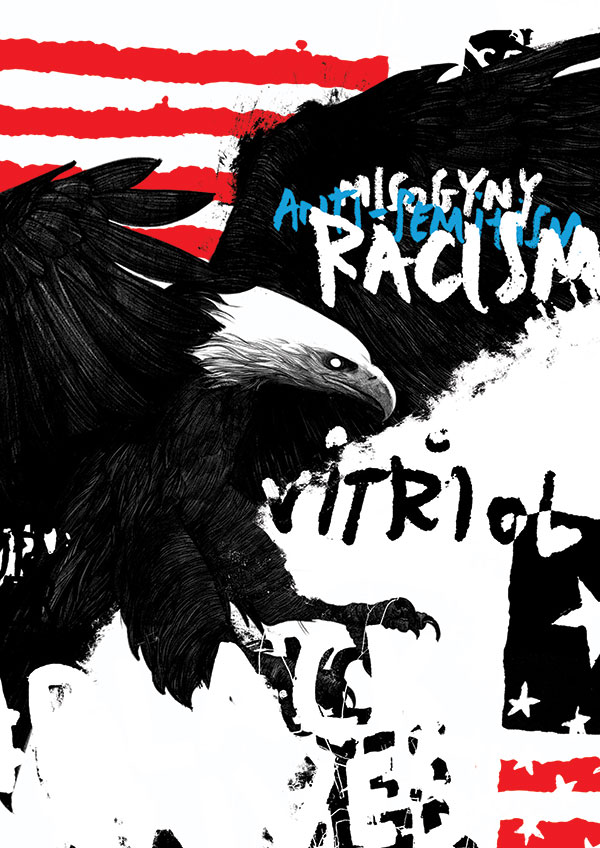
It may also be comforting to know that humour is not dead. One of the best recent examples came from Yair Rosenberg, a writer at the Tablet, a Jewish newspaper, who ranked second on the ADL’s list of most targeted names on Twitter. “My 12,000th follower will receive a free ticket to the meeting where we Jews decide who will be the Republican nominee for president,” he tweeted in April last year. Six minutes later, after someone called Franz Sturmfuhrer picked it up, Rosenberg wrote: “Oh great, this is now being retweeted unironically by actual anti-Semites.” Herr Sturmfuhrer promptly vanished.

So are our fears exaggerated? Isn’t Twitter just a bunch of frustrated men ruining a once promising business model? There is some truth to that. But two thoughts give pause. First, Twitter was the rocket booster for Donald Trump’s candidacy. Even today, on the eve of the election, with a just a handful of media staff, Trump announces policies on his Twitter feed — often during the small hours and sometimes in contradiction of his previous tweets. As Trump has tweeted: “I love Twitter — it’s like owning your own newspaper — without the losses!”
Second, with 313 million active users, Twitter’s universe is bigger than the world’s English-language newspapers combined. It has almost doubled its active usership in the past four years. If it is a dying medium, what are newspapers? Had Twitter been funded by venture capitalists from somewhere other than Silicon Valley — with its Uber-scale ambitions for social-media valuations — the world would judge it a success.
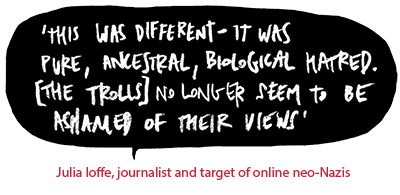
Sadly for many of the site’s politer members, Twitter appears confused about what it wants to be. Nobody wants to acquire it. It could clean up by announcing a clear policy for deactivating abusive participants. It occasionally bans people — Milo Yiannopoulos, the British technology editor of Breitbart News, was notoriously kicked off Twitter, where he had 338,000 followers, after some of his tweets were seen as inciting those deluging the black actress Leslie Jones with racist abuse. But his expulsion was an outlier. Barely one-fifth of the anti-Semitic tweeters identified by ADL were deactivated. Twitter could also ban software-created “bot accounts”.
For now, however, the site has chosen to suffer from Gresham’s law. The bad is driving out the good. Come to think of it, you might say the same of western democracy.
Yet even if Twitter vanished, a new avatar would arise in its place. “Technology is a facilitator,” says Jean Twenge, author of The Narcissism Epidemic, about the rise of a more self-centred youth. “The problem comes from society.” There are troubling signs that younger millennials — those born since 1995, whom Twenge calls the iGen since they were the first to grow up with the internet — are more prone to online rage than others.
Just 3 per cent of Americans over 65 suffer from clinical narcissism compared to 10 per cent of those under 30. It is an extraordinary leap that Twenge blames partly on modern-day parenting. “Kids are constantly told they are special and fed with fantasies that they can be anything they choose if they only put their minds to it,” she says. “When they find out that isn’t true, some of them get angry.”
Research also shows that the more time you spend online, the less you are able to empathise with other people’s feelings — a classic narcissistic trait. Much of what now passes for normal behaviour — parading your life in front of strangers, marketing your existence to appear far happier than it is — has been made acceptable by what Twenge calls “celebrity super-enablers”. For young women, that might be Kim Kardashian, the reality-TV star who has turned exhibitionism into a business model. For angry white men of any age, it is Trump, who has made a bonfire of political correctness.
“All kinds of prejudices we thought were disappearing are suddenly OK again because the Republican presidential nominee is saying it,” says Twenge. “Trump has given them a green light.”
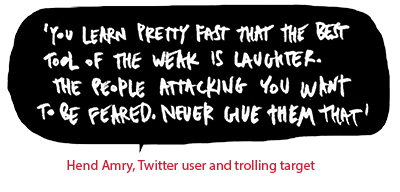
It does not follow that the anger will vanish if Trump hits a red light on Tuesday. Some, including everyone I interviewed for this article, predict it will grow if Trump is defeated — even if he accepts the outcome, which is doubtful. That includes Richard Spencer. It also includes Hend Amry, one of Twitter’s most kinetic users, who goes by the name of @Libyaliberty.
I contacted Amry, a US-born Muslim, because she stands out. There are not many bescarfed Muslim women on Twitter doling out such sharp asides in English. Like Spencer, with whom she refuses to engage (“There are some hateful individuals I want nothing to do with,” she says), Amry loves Shakespeare. She studied English at the University of Maryland. Like Ioffe, her parents moved to the US to escape oppression. Her late father loved America.
Amry’s ordeal with trolling began after the 9/11 attacks, which occurred years before the launch of Twitter. “I suddenly discovered I was a foreigner in my own country,” she says. “People called me terrorist to my face. Someone once ripped off my hijab. People still tell me I’m an oppressed woman because of my appearance.”
Amry puts down her detractors with unfailing courtesy. Often she asks: “Did you think I asked my husband’s permission before I spoke?” Like Rosenberg’s, her weapon of choice is humour. Talking to Amry, I could not help but think of Charlie Chaplin’s 1940 movie The Great Dictator, which, by lampooning the comic vanities of Hitler and Mussolini, did as much as anything to soften public opposition to America’s entry into the second world war.
In the case of the alt-right, they are more than capable of lampooning themselves without any help. After a few minutes of listening to the Daily Shoah podcast, alarm gives way to relief. A bunch of young men sniggering about the people they dislike is not so much Joseph Goebbels as Beavis and Butt-Head. “As a female Muslim in America you learn pretty fast that the best tool of the weak is laughter,” says Amry. “The people attacking you want to be feared. That is their currency. Never give them that.”
I was also drawn to Amry because of her basic human decency — a quality that often seems to be extinct if you spend too much time on Twitter. People call Amry all sorts of names. She never retaliates. The same applies in the Persian Gulf, where Amry now lives, and where people sometimes accuse her of being an American apologist. “When someone is nasty, I know that deep down they are unhappy,” says Amry. “These are lonely people lashing out. I am always hopeful that I can reach something better inside them.”
Her words remind me of Lindy West, a feminist writer, who was the victim of harrowing online harassment. Shortly after her father died, someone copied his photograph and set up a Twitter handle in his name. She began to receive tweets from her father calling her ghastly names, such as “fat slut”. Against her instincts, West wrote about how much the ghoulish impersonation had wounded her. The chances were that going public would only feed her tormentor’s id. Her fear was belied. Soon afterwards, she received an email from the culprit. It was sent in his real name so she realised he was sincere.
“I can’t say sorry enough,” he wrote. “It was the lowest thing I had ever done. [After reading your piece] it finally hit me. There is a living, breathing human being who is reading this shit. I am attacking someone who has never harmed me in any way. And for no reason whatsoever.” He made a $50 donation to her father’s cancer treatment centre.

It would be tempting to treat West’s story as a hopeful portent for our age. Alas, that may be too quixotic. The vitriol is unlikely to evaporate. The offline forces that have driven Trump’s candidacy are real. Some of them are understandable — resentment of wealthy America’s boundless self-admiration among them. Meritocracy is not all it is cracked up to be. To many, it may even look like a hoax.
Likewise, the rules of political correctness are almost begging for a backlash. Who decreed that changing the name of a football team from the Redskins merited more fuss than Native America’s destitution? Who decided privileged students need “safe spaces” from contrary opinion? Liberal America’s preoccupations understandably enrage those who consider themselves to be society’s losers.
These features of modern America will not go away even if Trump is heavily defeated. Indeed, the election of America’s first female president could magnify the hate. If there is one constant to public abuse, it is that women get it more harshly. For better or worse, technology has made it easier to pour old wine into new bottles. A lot of it is pure vinegar. Perhaps the best we can do is spit it out, give the world a smile and insist on a higher quality.
Edward Luce is the FT’s chief US columnist and commentator
Illustrations by David Foldvari
The comments on this story will be open between 10am GMT and 6pm GMT on Friday, November 4
This article was amended on November 4 to clarify the nature of Richard B Spencer’s involvement in The Daily Shoah podcast
Comments